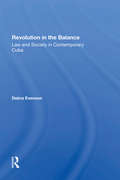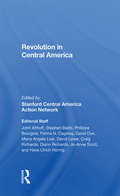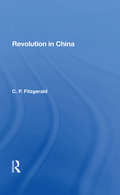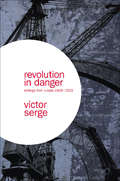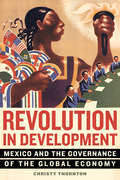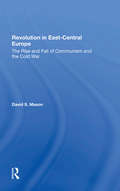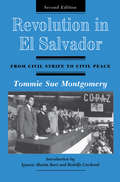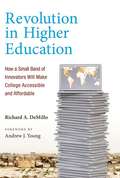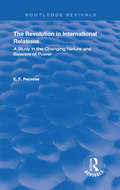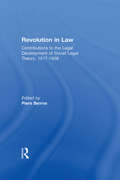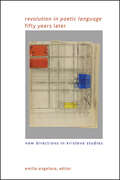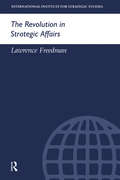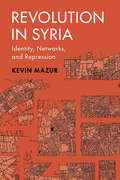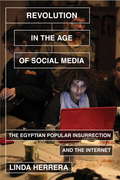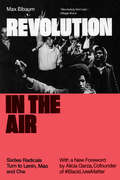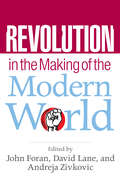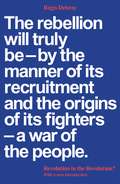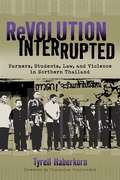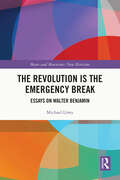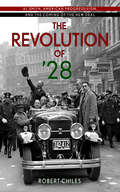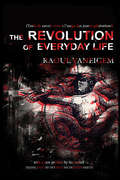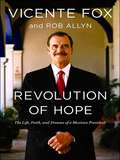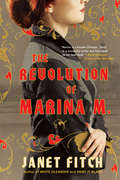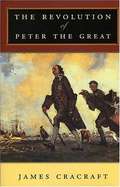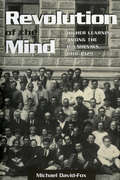- Table View
- List View
Revolution In The Balance: Law And Society In Contemporary Cuba
by Debra EvensonThis book is the product of more than four years' work, during which I receivedthe generous help and support of many friends and colleagues both inthe United States and in Cuba. I express my special gratitude to Raul GomezTreto and Emilio Marill Rivero for opening their libraries to me and for theirvaluable insights and suggestions. To the librarians at the Supreme Court ofCuba, the National Union of Cuban Jurists and the DePaul University Collegeof Law for their help in finding materials. To the National Union of CubanJurists, especially Magali Rojas and Rosario Fernandez, for doing somuch to facilitate my research in Cuba. To my research assistants StacyPochis, Tracy McGonigle and Lisa Acevedo for their painstaking work trackingdown information. To those who read drafts and provided critical comments,especially Jules Lobel, Carole Travis, Esther Mosak and MarcPoKempner. To Bill Montross for doing the copyediting. To DePaul Universityand Dean John Roberts of the College of Law for their support of thisproject from its inception and for providing funding for the research.
Revolution In Central America
by Stanford Central America Action Network John Althoff María Angela Leal Stephen Babb David Lowe Philippe Bourgois Craig Richards Fatma N. Çagatay Diann Richards David Dye Jo-Anne Scott Hans Ulrich HornigCentral America, though affected for decades by profound socioeconomic transformations, has been more or less quiescent politically. The sudden eruption of revolutionary turmoil in the region, as seen in recent events in Nicaragua, El Salvador, and Guatemala, has shattered the political status quo and cast Central America into the U.S. foreign poli
Revolution In China
by C. P. Fitzgerald C P FitzgeraldThis book, a study of revolution in China, considers movements of Western origin, such as Christianity or Communism, only as they appear in the Chinese context, treating them as integral factors in the Chinese revolutionary situation.
Revolution In Danger: Writings from Russia 1919–1921
by Victor SergeUpon arrival in Petrograd in 1919, Victor Serge - the great chronicler of the Russian Revolution - found a society nearly shredded to ribbons by civil war. In these essays he sketches a portrait of the darkest hours faced by the fledgling revolution, and defends the red terror against abstract criticisms as a regrettable, though unavoidable, product of horrible circumstances.
Revolution in Development: Mexico and the Governance of the Global Economy
by Christy ThorntonRevolution in Development uncovers the surprising influence of postrevolutionary Mexico on the twentieth century's most important international economic institutions. Drawing on extensive archival research in Mexico, the United States, and Great Britain, Christy Thornton meticulously traces how Mexican officials repeatedly rallied Third World leaders to campaign for representation in global organizations and redistribution through multilateral institutions. By decentering the United States and Europe in the history of global economic governance, Revolution in Development shows how Mexican economists, diplomats, and politicians fought for more than five decades to reform the rules and institutions of the global capitalist economy. In so doing, the book demonstrates, Mexican officials shaped not only their own domestic economic prospects but also the contours of the project of international development itself.
Revolution In East-central Europe: The Rise And Fall Of Communism And The Cold War
by David S MasonThe year 1989 marked a turning point in world history, a watershed year of unprecedented drama and political significance. No matter how one looks at those events–as the fall of communism, the democratization of Eastern Europe, or the end of the cold war–it is important to understand how the world travelled the distance of time, space, and ideology to arrive at the Berlin Wall and tear it down. David Mason provides that understanding in a concise synthesis of history, politics, economics, sociology, literature, philosophy, and popular, as well as traditional, culture. He shows how all these elements combined to yield the year that effectively closed the twentieth century–and promised to launch the new century on a hopeful note. Starting with Poland's elections in June 1989, the countries of then-communist Eastern Europe one by one revolutionized their governments and their polities; Hungary opened its borders to the West, East Germany rushed through, Czechoslovakia elected Vaclav Havel president, Bulgaria changed both party and leadership, and Romania executed Ceausescu. Although Gorbachev enabled many of these changes, he did not cause them. The illumination of the complex symbiosis between dynamics in Eastern Europe and the Soviet Union is one of the greatest contributions this book makes. With undercurrents emphasizing the power of ideas, the spirit of youth, and the multifaceted force of culture and ethnicity, Mason takes the reader far beyond the events of change and into their impetus and outcomes. He applies theories of social movements, democratization, and economic transition with an even hand, showing the interaction of their effects not only regionally but worldwide. The concluding chapter puts the revolutions in Eastern Europe into international perspective and highlights their impact on East-West relations, security alliances, and economic integration. Mason discusses the European Community, the United States and the Soviet Union, and the Third World in relation to the new East-Central European configuration. Using delightful and provocative cartoons from Eastern European and Soviet presses, interesting photos, valuable tables of data, and illuminating figures, Mason emphasizes important points about the role of nationalism, ethnicity, public opinion, and harsh economic reality in the revolutionary process.
Revolution In El Salvador: From Civil Strife To Civil Peace, Second Edition
by Tommie Sue MontgomerySince the first edition of this book appeared in 1982, El Salvador has experienced the most radical social change in its history. Ten years of civil war, in which a tenacious and creative revolutionary movement battled a larger, better-equipped, US-supported army to a standstill, have ended with 20 months of negotiations and a peace accord that promises to change the course of Salvadorean society and politics. This book traces the history of El Salvador, focusing on the oligarchy and the armed forces, that shaped the Salvadorean army and political system. Concentrating on the period since 1960, the author sheds new light on the US role in the increasing militarization of the country and the origins of the oligarchy-army rupture in 1979. Separate chapters deal with the Catholic church and the revolutionary organizations, which challenged the status quo after 1968. In the new edition, Dr Montgomery continues the story from 1982 to the present, offering a detailed account of the evolution of the war. She examines why Duarte's two inaugural promises, peace and economic prosperity could not be fulfilled and analyzes the electoral victory of the oligarchy in 1989. The final chapters closely follow the peace negotiations, ending with an assessment of the peace accords, and evaluate the future prospects for El Salvador and for the 1994 elections.
Revolution in Higher Education
by Richard A. DemilloColleges and universities have become increasingly costly, and, except for a handful of highly selective, elite institutions, unresponsive to twenty-first-century needs. But for the past few years, technology-fueled innovation has begun to transform higher education, introducing new ways to disseminate knowledge and better ways to learn -- all at lower cost. In this impassioned account, Richard DeMillo tells the behind-the-scenes story of these pioneering efforts and offers a roadmap for transforming higher education. Building on his earlier book, Abelard to Apple, DeMillo argues that the current system of higher education is clearly unsustainable. Colleges and universities are in financial crisis. Tuition rises inexorably. Graduates of reputable schools often fail to learn basic skills, and many cannot find suitable jobs. Meanwhile, student-loan default rates have soared while the elite Ivy and near-Ivy schools seem remote and irrelevant. Where are the revolutionaries who can save higher education? DeMillo's heroes are a small band of innovators who are bringing the revolution in technology to colleges and universities. DeMillo chronicles, among other things, the invention of MOOCs (Massive Open Online Courses) by professors at Stanford and MIT; Salman Khan's Khan Academy; the use of technology by struggling historically black colleges and universities to make learning more accessible; and the latest research on learning and the brain. He describes the revolution's goals and the entrenched hierarchical system it aims to overthrow; and he reframes the nature of the contract between society and its universities. The new institutions of a transformed higher education promise to demonstrate not only that education has value but also that it has values -- virtues for the common good.
The Revolution in International Relations: A Study in the Changing Balance of Power (Routledge Revivals)
by E.F. PenrosePublished in 1965: The study examines the changing structure and pattern of international relations in a world wide context. Defining balance of power in a dynamic sense akin to that of a "moving equilibrium".
Revolution in Law: Contributions to the Legal Development of Soviet Legal Theory, 1917-38
by Piers BeirneThe essays in this volume reassess pre-revolutionary Russian legal culture, the debates of the 1920s over the role of law under socialism, and the abrupt and bloody termination of the debate which took place in the 1930s.
"Revolution in Poetic Language" Fifty Years Later: New Directions in Kristeva Studies (SUNY series in Gender Theory)
by Emilia AngelovaIn her 1974 Revolution in Poetic Language, Julia Kristeva resisted the abstract use of language, with its aim of totalization and finality, in all its colonizing and alienating forms. A major thinker and critic, Kristeva reappropriated Hegel's concepts of desire and negativity, in conjunction with the thought of Heidegger, Arendt, Freud, and Lacan, to revolt against modernity's culture of nihilism and the West's inability to deal with loss. This collection celebrates the fiftieth anniversary of Revolution in Poetic Language by revisiting Kristeva's oeuvre and establishing exciting new directions in Kristeva studies. Engaging with queer and transgender studies, disability studies, decolonial studies, and more, renowned and rising scholars plot continuities in—and push the boundaries of—Kristeva's thinking about loss, revolution, and revolt. The volume also includes two essays by Kristeva, translated into English for the first time here—"The Impossibility of Loss" (1988) and "Of What Use Are Poets in Times of Distress?" (2016).
The Revolution in Strategic Affairs (Adelphi series #318)
by Lawrence FreedmanRapid developments in information technology and precision weaponry are said to herald a 'revolution in military affairs' (RMA), making possible quick and decisive victories with minimal casualties and collateral damage. But has such a revolution taken place? The issues that drive conflict will persist, and many of the technical advances associated with the RMA will not necessarily produce a transformation in the nature of warfare. The end of the Cold War has highlighted another revolution one in political affairs. Major powers appear less likely to go to war with one another than they are to intervene in conflicts involving weak states, with potential opponents including militia groups, drug cartels and terrorists. RMA technology may be less suited to conflicts such as these. If the cumulative effect of these changes has produced a revolution, it is a revolution in strategic, as much as military, affairs. This paper argues that: the RMA is the practical expression of a 'Western Way of Warfare', the key features of which are: professional armed forces; intolerance of casualties; and intolerance of collateral damage the key technological and conceptual components of the RMA were in place by the early 1970s. The trend has therefore been evolutionary, rather than revolutionary. The significant difference is in the new political setting of the end of the Cold War, and the revolution in perceptions of Western particularly US conventional military strength brought about by the Gulf War of 1991 the Gulf conflict could mark the start of a true 'revolution' if future battles offer similar opportunities to exploit the RMA's technology. However, since the US and its allies appear unbeatable when fighting on their own terms, future opponents will fight differently the West will therefore face opponents who will follow strategies that contradict the Western Way of Warfare. They will avoid pitched battles, will exploit the West's reluctance to inflict civilian suffering, and will target their opponent's domestic political base, as much as its forward troops. The problem for the West is not how to prevail, but how to do so in an acceptable manner. The more warfare becomes entwined with civilian activity, the more difficult it is to respond with the type of decisive and overwhelming military means embodied in the RMA. The RMA does not create a situation in which information is the only commodity at stake, and so does not offer the prospect of a 'virtual war'. The new circumstances and capabilities do not prescribe one strategy, but extend the range of strategies available. The issue underlying the RMA is the ability of Western countries, in particular the US, to follow a line geared to their own interests and capabilities.
Revolution in Syria: Identity, Networks, and Repression (Cambridge Studies in Comparative Politics)
by Kevin MazurHow does protest advancing diverse claims turn into violent conflict occurring primarily along ethnic lines? This book examines that question in the context of Syria, drawing insight from the evolution of conflict at the local level. Kevin Mazur shows that the challenge to the Syrian regime did not erupt neatly along ethnic boundaries, and that lines of access to state-controlled resources played a critical structuring role; the ethnicization of conflict resulted from failed incumbent efforts to shore up network ties and the violence that the Asad regime used to crush dissent by challengers excluded from those networks. Mazur uses variation in the political and demographic characteristics of locales to explain regime strategies, the roles played by local intermediaries, the choice between non-violent and violent resistance, and the salience of ethnicity. By drawing attention to cross-ethnic ties, the book suggests new strategies for understanding ostensibly ethnic conflicts beyond Syria.
Revolution in the Age of Social Media
by Linda HerreraEgypt's January 25 revolution was triggered by a Facebook page and played out both in virtual spaces and the streets. Social media serves as a space of liberation, but it also functions as an arena where competing forces vie over the minds of the young as they battle over ideas as important as the nature of freedom and the place of the rising generation in the political order. This book provides piercing insights into the ongoing struggles between people and power in the digital age.
Revolution in the Air: Sixties Radicals Turn to Lenin, Mao and Che
by Max ElbaumRevolution in the Air is the definitive study of how radicals from the sixties movements embraced twentieth-century Marxism, and what movements of dissent today can learn from the legacies of Lenin, Mao and Che.
Revolution in the Making of the Modern World: Social Identities, Globalization and Modernity
by David Lane John Foran Andreja ZivkovicThis volume questions whether ideas of revolution are still relevant in the postmodern and globalized world of the twenty-first century. Featuring contributions from some of the world's leading sociological and political thinkers on revolution, it combines theoretical concerns with a variety of detailed case studies of individual revolutions. Subjects covered include: democracy and revolution from 1789 to 1989 twentieth century revolutions and theories of revolution, including Marxism, modernization and structuralist theories revolution in the "Third World" and the variable geometry of the paths to modernity Islamic revolutions and modernity the 1989 revolutions as "democratic revolutions" or "elite-led transitions" globalization, the nation-state and revolution empire and "democratic revolution" network society and revolution Islamic fundamentalism, international terrorism and revolution democratic revolution as a new form of revolution postmodern theories of revolution new social movements, identities and new figures of revolution. Revolution in the Making of the Modern World will be essential reading for students and scholars of comparative politics, political theory, revolution and political sociology.
Revolution in the Revolution?
by Regis DebrayRevolution in the Revolution? is a brilliant, pragmatic assessment of the situation in Latin America in the 1960s. First published in 1967, it became a controversial handbook for guerrilla warfare and revolution, read alongside Che’s own pamphlets, and remains fully as important as the writings of Guevara. Lucid and compelling, it spares no personage, no institution, and no concept, taking on not only Russian and Chinese strategies but Trotskyism as well.The year it was published, Debray was convicted of having been part of Guevara’s guerrilla group and sentenced to thirty years in prison. He was released in 1970, following an international campaign, which included appeals by Jean-Paul Sartre, André Malraux, General Charles de Gaulle and Pope Paul VI.
Revolution Interrupted
by Tyrell HaberkornIn October 1973 a mass movement forced Thailand's prime minister to step down and leave the country, ending nearly forty years of dictatorship. Three years later, in a brutal reassertion of authoritarian rule, Thai state and para-state forces quashed a demonstration at Thammasat University in Bangkok. InRevolution Interrupted, Tyrell Haberkorn focuses on this period when political activism briefly opened up the possibility for meaningful social change. Tenant farmers and their student allies fomented revolution, she shows, not by picking up guns but by invoking laws-laws that the Thai state ultimately proved unwilling to enforce. In choosing the law as their tool to fight unjust tenancy practices, farmers and students departed from the tactics of their ancestors and from the insurgent methods of the Communist Party of Thailand. To first imagine and then create a more just future, they drew on their own lived experience and the writings of Thai Marxian radicals of an earlier generation, as well as New Left, socialist, and other progressive thinkers from around the world. Yet their efforts were quickly met with harassment, intimidation, and assassinations of farmer leaders. More than thirty years later, the assassins remain unnamed. Drawing on hundreds of newspaper articles, cremation volumes, activist and state documents, and oral histories, Haberkorn reveals the ways in which the established order was undone and then reconsolidated. Examining this turbulent period through a new optic-interrupted revolution-she shows how the still unnameable violence continues to constrict political opportunity and to silence dissent in present-day Thailand.
The Revolution is the Emergency Break: Essays on Walter Benjamin (Marx and Marxisms)
by Michael LöwyWinner of the 2020 European Walter Benjamin Prize, The Revolution is the Emergency Break is a rich discussion of Walter Benjamin’s lesser-known writings by renowned social scientist Michael Löwy. Translated into several languages but available in English for the very first time, Löwy’s book brings together the philosophical, literary, theological and cultural aspects of Benjamin’s writings, including his relation to figures such as Gershom Scholem and Franz Rosenzweig, his interpretation of historical materialism, surrealism, anti-fascism and anarchism, his contribution to understanding capitalism as a religion, and his relevance for Latin America and ecology today. The concept of revolution in his writings – not only the political ones but also those that deal with art, literature or theology, run through the work, connecting the various chapters. The Revolution is the Emergency Break also features four new chapters in this collection. Written in a clear-eyed, accessible language, The Revolution is the Emergency Break is a must-read for researchers, teachers and students interested in the works of this influential German intellectual.
The Revolution of ’28: Al Smith, American Progressivism, and the Coming of the New Deal
by Robert ChilesThe Revolution of ’28 explores the career of New York governor and 1928 Democratic presidential nominee Alfred E. Smith. Robert Chiles peers into Smith’s work and uncovers a distinctive strain of American progressivism that resonated among urban, ethnic, working-class Americans in the early twentieth century. The book charts the rise of that idiomatic progressivism during Smith’s early years as a state legislator through his time as governor of the Empire State in the 1920s, before proceeding to a revisionist narrative of the 1928 presidential campaign, exploring the ways in which Smith’s gubernatorial progressivism was presented to a national audience. As Chiles points out, new-stock voters responded enthusiastically to Smith's candidacy on both economic and cultural levels.Chiles offers a historical argument that describes the impact of this coalition on the new liberal formation that was to come with Franklin Delano Roosevelt’s New Deal, demonstrating the broad practical consequences of Smith’s political career. In particular, Chiles notes how Smith’s progressive agenda became Democratic partisan dogma and a rallying point for policy formation and electoral success at the state and national levels. Chiles sets the record straight in The Revolution of ’28 by paying close attention to how Smith identified and activated his emergent coalition and put it to use in his campaign of 1928, before quickly losing control over it after his failed presidential bid.
The Revolution of Everyday Life: Aka The Revolution Of Everyday Life
by Raoul VaneigemOne of the most important exponents of Situationist ideas, this treatise presents an impassioned critique of modern capitalism and serves as a cornerstone of modern radical thought. Originally published in early 1968, the book both kindled and colored the May 1968 upheavals in France that captured the attention of the world. In the political climate of today, Raoul Vaneigem's important work of radical anticapitalist thought has struck a new chord with the worldwide Occupy Movement. Naming and defining the alienating features of everyday life in consumer society—survival rather than living in full, the call to sacrifice, the cultivation of false needs, the dictatorship of the commodity, subjection to social roles, and the replacement of God by the economy—the book argues that the countervailing impulses that exist deep within this alienation, such as creativity, spontaneity, and poetry, present an authentic alternative to nihilistic consumerism. This carefully edited new translation marks the first North American publication of this important work and includes a new preface by the author and a translator's note.
Revolution of Hope
by Vicente Fox Rob AllynThe charismatic former president of Mexico offers a candid and provocative perspective on the state of world affairs. As president of Mexico, Vicente Fox brought true democracy to the country after seven decades of one party rule. Elected as a political outsider with a message of honesty, change, and hope, he is truly a hero of democracy, and this vivid book interweaves his inspiring personal story with his hopeful new vision for the future of the Americas. President Fox candidly reveals the ups and downs of his relationships with world leaders from George W. Bush and Tony Blair to Fidel Castro, Vladimir Putin, and Hugo Chávez. He also speaks out on hot global topics such as immigration, the war in Iraq, racism, the United Nations, free trade, and the moral imperative to heal the global divide between rich and poor nations. Outspoken, impassioned, sincere, and engaging, Vicente Fox embodies a quality that seems all too rare in world politics these days-the moral character of a genuine leader.
The Revolution of Marina M.: A Novel (A Novel)
by Janet FitchFrom the mega-bestselling author of White Oleander and Paint It Black, a sweeping historical saga of the Russian Revolution, as seen through the eyes of one young womanOne of Entertainment Weekly's Most Buzzworthy Books of Fall 2017St. Petersburg, New Year's Eve, 1916. Marina Makarova is a young woman of privilege who aches to break free of the constraints of her genteel life, a life about to be violently upended by the vast forces of history. Swept up on these tides, Marina will join the marches for workers' rights, fall in love with a radical young poet, and betray everything she holds dear, before being betrayed in turn.As her country goes through almost unimaginable upheaval, Marina's own coming-of-age unfolds, marked by deep passion and devastating loss, and the private heroism of an ordinary woman living through extraordinary times. This is the epic, mesmerizing story of one indomitable woman's journey through some of the most dramatic events of the last century.
The Revolution Of Peter The Great
by James CracraftMany books chronicle the remarkable life of Russian tsar Peter the Great, but none analyze how his famous reforms actually took root and spread in Russia. In The Revolution of Peter the Great, James Cracraft offers a brilliant new interpretation of this pivotal era. Linking together and transcending Peter's many reforms of state and society, Cracraft argues, was nothing less than a cultural revolution. New ways of dress, elite social behavior, navigation, architecture, and image-making emerged along with expansive vocabularies for labeling new objects and activities. Russians learned how to build and sail warships; train, supply, and command a modern army; operate a new-style bureaucracy; conduct diplomacy on a par with the other European states; apply modern science; and conceptualize the new governing system. Throughout, Peter remains the central figure, and Cracraft discusses the shaping events of the tsar's youth, his inner circle, the resistance his reforms engendered, and the founding of the city that would embody his vision--St. Petersburg, which celebrated its tercentenary in 2003. By century's end, Russia was poised to play a critical role in the Napoleonic wars and boasted an elite culture about to burst into its golden age. In this eloquent book, Cracraft illuminates an astonishing transformation that had enormous consequences for both Russia and Europe, indeed the world.
Revolution of the Mind: Higher Learning among the Bolsheviks, 1918–1929 (Studies of the Harriman Institute)
by Michael David-FoxUsing archival materials never previously accessible to Western scholars, Michael David-Fox analyzes Bolshevik Party educational and research initiatives in higher learning after 1917. His fresh consideration of the era of the New Economic Policy and cultural politics after the Revolution explains how new communist institutions rose to parallel and rival conventional higher learning from the Academy of Sciences to the universities. Beginning with the creation of the first party school by intellectuals on the island of Capri in 1909, David-Fox argues, the Bolshevik cultural project was tightly linked to party educational institutions. He provides the first account of the early history and politics of three major institutions founded after the Revolution: Sverdlov Communist University, where the quest to transform everyday life gripped the student movement; the Institute of Red Professors, where the Bolsheviks sought to train a new communist intellectual or red specialist; and the Communist Academy, headquarters for a planned, collectivist, proletarian science.
